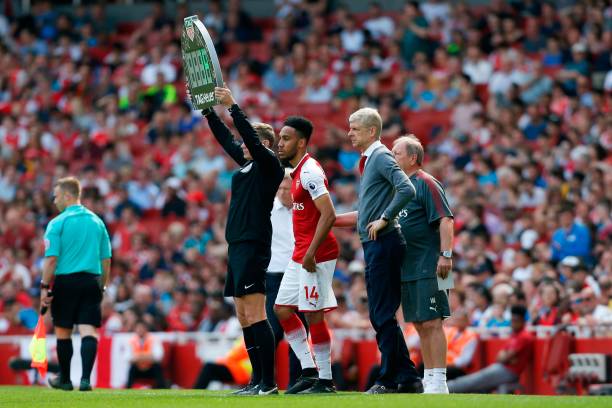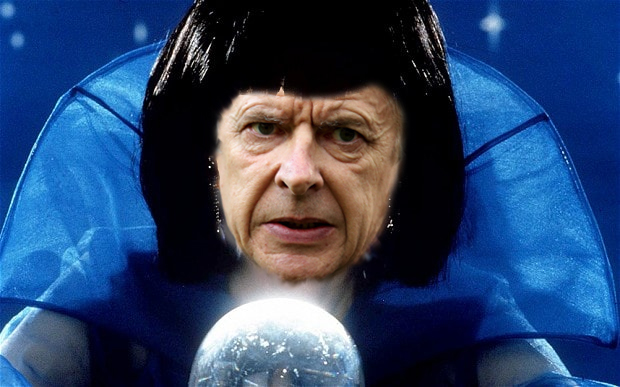Arsene Wenger is at it again, this time predicting that within five years football clubs will be turning to fans on social media to determine substitutes and his history of predicting things within football means we should be listening.
It seems like a daft idea on the face of it but if there’s one thing we should all know by now it’s not to doubt Arsene Wenger when he tells us how football is going to change.
This is a man who has made predictions for over 20 years and has, by an impressive margin, been right more often than he has been wrong.
When you think about the premise, it actually isn’t that far-fetched and it’s not hard to see how we get from here to there.
Social media has allowed people to become involved in areas of life they previously had no say and as football moves away from the importance of fans in the stadium to placing emphasis on global fanbases who carry more financial clout, it doesn’t take a huge leap of imagination to think Wenger might be on to something.

“In the next five years, it might happen that social media substitutes players during a match,” he told German newspaper Bild. “They will have a hook-up at halftime and determine which players get substituted and who will be brought on during the second half.
“The power of clubs will only decrease. That’s why the heads in the clubs must become stronger. You must step up the fight against the influence from the outside.”
Predicting that his side could go unbeaten in the Premier League, that we would soon see the first £200m player and hundreds of other things in between, Mystic Weg’s penultimate big prophecy before he left was that we would see the football world move closer to the real job market, in action if not necessarily salary level.
Speaking at his press conference ahead of the Community Shield game against Chelsea, Wenger first brought up the idea: “Because the transfers are so high, you will see more and more players going into the final year of the contract because no club will want to pay the amount demanded. I’m convinced, in the next 10 years, it will become usual.”
Although Wenger was in England for decades, his level of insight into the game is still not really appreciated.
In fact, in a Mirror article on this subject, Brian Reade asked, “So, have his marbles gone or is a man we used to hail as a visionary simply foretelling the inevitable conclusion of Bosman?”
The reasonable answer to that would be ‘neither you useless redtop f**kwit’. I hate people who present you with two options like this, both skewed to serve their obvious and pathetic agenda.
What Wenger was saying made sense. Why should a club receive a transfer fee for a player? When you move job, it’s likely that the new company doesn’t have to pay a penny to the old. There will be a period of notice that you have to work, and for which you will still be paid, and then you move.
Why shouldn’t footballers pocket the money that would otherwise go to clubs?
What it is also likely to mean is that smaller clubs will struggle without being able to generate big fees for players they have developed and fans will have to pay out more to make up any shortfall as people who kick a ball for a living collect ever-increasing salaries.
Wenger doubled down on those pre-season comments, adding, “This season, there were 107 players in the Premier League who got into the final year (not all at Arsenal despite what the press would have you believe) of their contract and you will see that more. The clubs want too much money for normal players.
“They say that if one player is worth £200m [like Neymar], then this player is worth £50m. But everybody knows for that player £50m is too much and they cannot afford it. So what happens? The club cannot sell and doesn’t extend the contract, so more and more players are going into the final year of their contract.
“Something will happen,” he continued. “For the first time, on the political front, the German prime minister has come out and, also, the president of Uefa has come out. I think, politically, something will happen in the next 12 months to regulate and limit the transfer amounts.
“You have to go one of two ways – regulate it properly or leave it completely open. You cannot be in between and that is where we are at the moment. It is only to the advantage of some clubs who can deal with the [financial fair play] rules in a legal way.
“The regulation has to be stricter and clearer, or open the market completely and you can do what you want provided you can guarantee you have the money to pay.
“At the moment, we are a bit in between and that does not work.”
Wenger also predicted that we will soon see a European Super League usurping weekend domestic football in his final Mystic Weg prediction before he called it a day as Arsenal manager.
Speaking at his final pre-match press conference ahead of the season’s final game at Huddersfield last season, Wenger said it was ‘inevitable’ that the bigger clubs will want to exclude smaller ones from the huge amounts of broadcast revenue they generate.
“In a few years you will certainly have a European league over the weekends,” said Wenger.
“It is inevitable. Why? First of all, to share money between the big clubs and small clubs will become a problem.
“The big clubs will say: ‘if two smaller clubs are playing each other nobody wants to watch it. People want to watch quality. So we have to share the money but nobody is interested in you’.
“A domestic league will certainly play Tuesday, Wednesday. I think that is the next step we will see.
“It will be soon because it is a way for other clubs to fight against the Premier League,” he added.
“Look at the audiences of the Champions League. There’s a contrast there because if you look at the audiences of the Champions League it is not fantastic.
“But if you have Real Madrid v Barcelona, or Real Madrid v Arsenal, or Manchester United v Bayern Munich every week the audiences will be good.
“If you want to make it [the Premier League] more attractive you have to go down to 16 [teams],” Wenger said.
“And make a real competition of it. But it will be smaller if it goes to Europe.”
Arsenal, Manchester United, Manchester City, Chelsea, Liverpool and Tottenham have already spent part of last season trying to renegotiate the broadcast share of the Premier League’s overseas revenue in what many feel is the first step towards a super league.
In 1992, teams voted to quit the First Division and set up the Premier League which would be broadcast on Sky Sports in a new deal worth £191.5m. TV money was starting to speak loudly.
For 15 years, Sky maintained a monopoly on football rights before this was finally called into question. In 2007, the contract was split into packages, with Setanta Sports, ESPN and BT Sport all having a go at challenging Sky’s dominance. This opened the door to the ridiculous money flooding the game today, as media companies looked to cash-in on the Premier League gravy train by throwing ever-increasing amounts to lock-in the rights.
Today, the Premier League is broadcast to more than 643 million homes worldwide, according to 2013 figures although recent reports suggest that these numbers are starting to decline. The availability of illegal, but free, online streams is just one reason why this might be the case.
In an attempt to get the best value for money from those millions of homes, Sky and BT now regularly move fixtures around to suit the armchair viewer, regardless of the impact on the match-going fan.
Where football goes next, Wenger hasn’t yet revealed, but you can be sure of one thing – wherever it is, it will be more expensive for us, the fans, when we get there.

